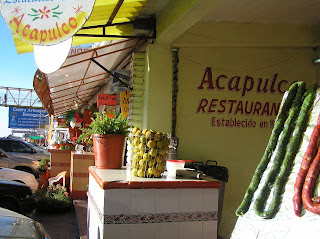


Oct. 15, 2007

Edith (surely the world's kindest English Dept. chair) invited us to go to Acapulco with her to stay at her brother-in-law Jose's house. Since we got a very early start, we stopped for breakfast at Tres Marías, a spot about an hour from the city. We pulled off Rt. 95D, the cuota (toll) road and into a tianguis (market) of food stands, one after the other, all with enticing aromas and tasty displays. We settled on the Restaurante Acapulco and ordered Quesadillas de flor de cabeza (Zucchini blossom quesadillas, one of my favorites), sweet tamales, chicken tacos, and coffee. The green sausage you see hanging in the photo is called longaniza; it's good. A vendor walked by and offered us samples of delicious Oaxaca cheese. By Sunday, hungry and stuck in traffic, we regretted our decision not to buy it - we must have still been half asleep. Cece proposed a rule we intend to follow: we will not pass up ever again any food or artesania that we reallly like. Agreed!
One incident marred our entry into Acapulco. As Rocinante was passing through an intersection, the light turned red. The cop ahead of us went through, and Bill (after looking both ways, of course) followed. Immediately, a motorcycle cop appeared out of nowhere and pulled us over. The dreaded mordida (bribe) was about to happen. In Mexico, a red light is widely considered a suggestion to stop, a warning to look carefully, an imperative to stop only if there is a good reason. Seeing none, most Mexicans will drive on through. In fact, during rush hour policemen are at the busiest intersections whistling people through with total disregard for the red lights; it's much more efficient. But we, driving quite possibly the only car from Maine in the whole country and mindful of our last outrageous mordida in 2004, are very careful to obey every single law.
This time, Edith went with Bill to talk to the cop. It's not considered good form to stay in the car. You must go to the policeman and address him with utmost respect if you hope to escape with a small mordida. Cece and I watched from the car. Bill just stood there, wiping his brow from time to time. Edith, a woman of consummate courtesy, did all the talking. The policeman ahead of us waved us through...her family was waiting for us at the house...we didn't see the light...we weren't familiar with the city...yada, yada...and the clincher: what could we do to arrange the matter? The cop passed her a book, she discreetly returned to the car, took out a 100 peso bill (around $10), slipped it into the book and gave it to the policeman, who then stopped traffic to allow Bill to U-turn to follow him to a better route. And that's how it's done in Mexico.
When Bill and I made our first trip to Mexico in 1972, we camped outside of Acapulco in a small town called Pie de la Cuesta. It's a spit of land between the booming waves and dangerous current of the Pacific and a quiet, peaceful lagoon where families swim and waterski. It's laid-back, lined with palm trees and more noted for beautiful sunsets than for the Acapulco nightlife. We were thrilled to find out that Jose's house is perched on a hillside at one end of the beach in Pie de la Cuesta, and when the caretakers Antonio and Ruth opened the gates for us, no one wanted to venture out again. So we descended the stairway to the beach, walked down to an open-air restaurant for dinner and came back to the house to watch the sunset from the pool. Heavenly.
No comments:
Post a Comment